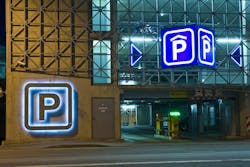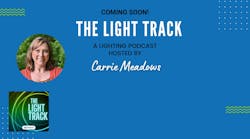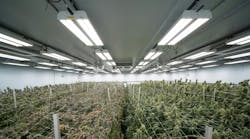In her iconic 1970 hit Big Yellow Taxi, Joni Mitchell sang, “They paved paradise and put up a parking lot.”
Joni might be pleased to know that a reversal of that scenario could be in store. If car use declines amid changing transportation habits (a big “if”), then something will have to be done with all of those parking lots and indoor garages that will no longer be needed.
Urban-gro, Inc., the Lafayette, Colo.–based indoor agricultural engineering and services firm, has an idea of what to do: Convert them into LED-lit vertical farms to help grow much needed crops.
CEO Bradley Nattrass put that point across in a conversation with David Cohen, the CEO of Austin, Texas–based horticultural LED lighting firm Fluence during a recent episode of the online video series Fluence Unfiltered. Nattrass credited urban-gro board member Sonia Lo with the idea.
“As autonomous vehicle usage and ride share usage increases, it’s her view that parking lots, parking garages, will start to transform into these urban vertical farms,” he told Cohen.
Such repurposing would be part of a broader trend toward comparatively small indoor farms that will be built in urban environments, the urban-gro boss said.
“[Sonia] helped us form this vision of, in the next decade, there’s going to be a great number of urban vertical farms,” Nattrass noted. “Not the super multi-hectare ones like you’re seeing here today. But urban vertical farms... These are smaller facilities, thirty-to-fifty thousand square feet. They are being built in retail or food service distribution centers. They can be built in remote locations. They can be retrofit into existing buildings.”
Nattrass also suggested that Russia’s current disruption of the world’s food supply has further raised awareness of indoor food production.
“With what’s happening in Eastern Europe right now, the CEA [controlled environment agriculture] industry is seeing an influx of money into the food side of the business,” he said.
Conversely, LED and LED lighting vendors ams Osram and Fluence owner Signify recently reported that rising energy costs — a consequence of Russia’s war — has limited horticultural lighting sales, as growers are finding the upfront costs of new lighting unaffordable.
Urban-gro focuses much of its work on indoor vertical farms, where growers stack crops under LED lights with no sun. LED lighting also helps augment natural light and high-pressure sodium (HPS) light in the greenhouse sector, which is not currently the center of urban-gro’s attention.
An increase in revenue from food growers would be a welcomed development for urban-gro, which last week reported a slump in third-quarter sales to $12.4 million from $18.3 million in the third quarter ending Sept. 30, 2021. It attributed the decline not to the food sector, but to “significantly reduced equipment demand in the U.S. cannabis market as a result of ongoing state-level regulatory delays in the license-awarding process, as well as the lack of movement on passing key industry financial support models such as the SAFE Banking Act.”
Meanwhile, vertical farms wherever they are — whether or not they claim back the parking lots — will bring advantages beyond providing food. Their spread “decreases the need to utilize vast amounts of [chemical] pesticides, if not eliminate them,” Nattrass said.
That might possibly bring another smile to Joni’s face given another line from her Yellow Taxi: “Hey farmer farmer, put away that DDT.”
Full disclosure: LEDs Magazine has no real idea of what Joni Mitchell’s thoughts are on vertical farming.
MARK HALPER is a contributing editor for LEDs Magazine, and an energy, technology, and business journalist ([email protected]).
For up-to-the-minute LED and SSL updates, follow us on Twitter. You’ll find curated content and commentary, as well as information on industry events, webcasts, and surveys on our LinkedIn page and our Facebook page.






